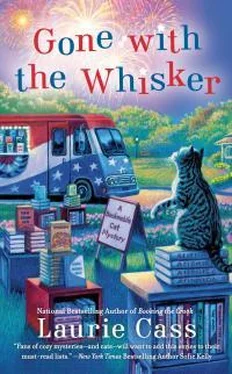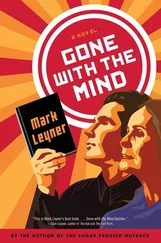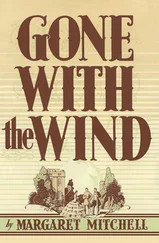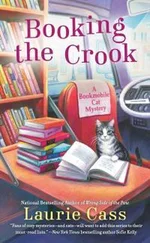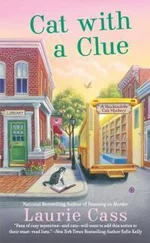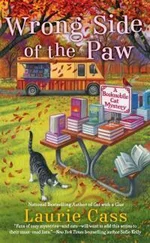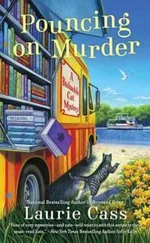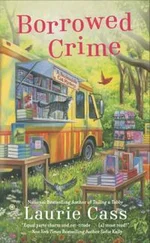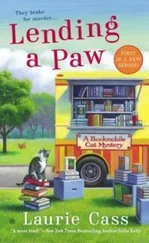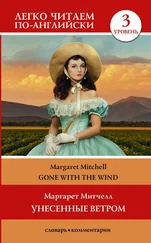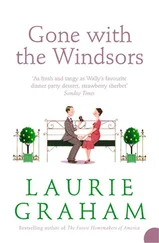“It’s not extra work,” I said quickly. “I’m happy to do this.” As I watched him open Jane Smiley’s Some Luck , I thought about what I’d learned so many times over: that you could never really know what was going on in people’s lives, and that you rarely knew what burdens people were carrying. All I’d known regarding Rupert’s request for a book stop was that for six weeks, no one in the house would be able to drive. I’d had no idea that Ann Marie had serious medical issues, and the knowledge that she did was deeply saddening.
“Happy to,” I said again, this time more firmly.
“And at least you keep your car in decent repair.” Rupert shot a look at my modest sedan. “That Courtney’s dripped oil all over the driveway. I swear she parked in a different spot every time she came here.”
“Noisy, too,” Ann Marie said as she came through the front door, laden with a tray. “No, you sit down, Minnie. I can do all this. Rupert would just get to nodding off in his chair and up that girl would drive. Don’t know if she even had a muffler on that thing. Or if she ever washed it. And those bumper stickers, my goodness. They’re nice and colorful, but the things they say aren’t anything I’d want our preacher to see.”
Something in my head went “click.” The last time I’d stopped at Ann Marie and Rupert’s house, Courtney, their home health aide, had been there, and I’d seen her car, but not the rear bumper. Could it have been the same car that had driven past the bookmobile on the day Rex and Nicole had been on the bookmobile for the last time?
“Those bumper stickers,” I said slowly. “Are they bright pink?”
Ann Marie handed me a glass of lemonade. “They certainly are. Shocking pink, they used to call it. Now I don’t think anything shocks anyone.”
So Courtney had indeed driven down Brown’s Road that day.
But what did it mean? Everything . . . or nothing?
Chapter 16
My niece stared at me over her half-empty plate. “You want me to do what?”
The heat had abated somewhat from the previous few days, and she’d come back to the marina early that morning. Partly because she’d run out of clean clothes and partly because Louisa had texted her, asking for babysitting services until she had to get to work, which would enable Louisa and Ted to run errands approximately ten thousand times faster than if they had a toddler in tow.
Kate had, apparently, been happy to do so, and when she’d returned after a few hours at Pam Fazio’s Older Than Dirt, I’d surprised her with a home-cooked dinner. Okay, it was spaghetti from a box with sauce from a jar, but Kristen had snobbed me up enough, food-wise, to want fresh Parmesan cheese instead of dried, and grating cheese counted as cooking to me.
We’d been eating on the front deck, with Eddie up on the roof keeping an eye on everything. Once upon a time I’d been worried when he’d jumped up there, but I’d laid those worries to rest long ago. He was fine up there. I even joined him, every once in a while, just to get a different view.
I smiled at Kate. “We,” I said, “are going over to visit Barb and Russ McCade tonight. They’re great people and they’re looking forward to meeting you.”
“Why?” she asked, frowning.
“Because they’re friends of mine and . . .” I stopped, because I didn’t have an answer for her. Not one that would make sense to a seventeen-year-old. Because how many high school kids could understand how rare true friendship was? And that the opportunity to grow that circle of friendship was a chance to grab on to? I was mixing metaphors in my head, which was never a good sign for comprehensible conversation, so I simply repeated myself. “They’re friends of mine and they want to meet you.”
Kate grumbled a bit, but after enticing Eddie off the roof by rattling the treat can, she got into my car without further complaint. And when I turned down the long and twisty driveway, she started to look interested in her surroundings.
“This goes to their house?” she asked.
“All the way down to the lake,” I said. “Did it in the bookmobile once.”
“Yeah?” Kate, for once, sounded impressed with her aunt. And when we stopped in front of the McCades’ lovely home, her eyes went wide. “Wow,” she said softly, staring at the fieldstone, the massive timbers, and the wooden front door with the rounded top. “This place is—”
The front door opened. “Minnie Hamilton!” Cade bellowed. “Get over here this minute!”
“Let me guess,” I said as Kate and I approached. “You and your lovely wife are fighting over whether or not a word is appropriate and you need me to referee. No, don’t tell me whose side is whose. Just give me the setup and the word.”
Despite the twenty-some-year differences in our ages, the McCades and I had bonded for life in a hospital room when I entered wholeheartedly into their word game. Rules had shifted over time, but it went something like this: The game started organically (part of the game) through each of them accidentally saying a word starting with the same letter. The winner was the last one to use a word that fit the situation and the loser had to acknowledge this gracefully.
“The letter is G,” Cade pronounced. “The word under consideration is ‘gracious,’ which was preceded by ‘go gargle,’ ‘great galoots,’ and ‘good gravy.’”
“Well,” I said. “Those are all double G words, so ‘gracious’ would have to be paired with another G word, but you can’t use anything that’s already been used. So unless someone comes up with something fast to go in front of ‘gracious,’ I’d say ‘good gravy’ is the winner.”
Cade gave me a smacking kiss on the forehead. “Hah! Did you hear that, Barb?”
“Of course I heard. Everyone within half a mile heard you. You were right and I was wrong. Now let me get a look at the niece.” Barb elbowed her way past her husband and smiled as she pulled her shoulder-length brownish-gray hair into a ponytail. “Kate, it’s nice to meet you.”
The two of them beamed at us. Well, Barb beamed. Cade did what he did, which was inspect the face of any new person he met as if he were selecting paint colors. He peered at Kate, his craggy features and cleft chin deepening in thought and his bushy eyebrows bushing. His hair was now more gray than brown and he was in dire need of a haircut, which usually meant one thing: He was painting, and Barb hadn’t been able to tear him away from his studio long enough to take a pair of scissors to him.
“Kate,” I said, “these are my friends Barb and Russell McCade.”
“Call me Cade, my dear.” He bowed, then took her hand and lifted it to his lips. “Any niece of Minerva’s,” he said, bestowing a gentle kiss on her knuckles, “is a Godsend to the world.”
Kate’s wide eyes stared at him and she snatched her hand back as soon as he let go. “But . . . you’re . . .” she stammered. “You’re that painter.”
“Ah, yes, the price of fame.” Cade smiled. “Yes, I’m that painter.”
“My art teacher?” Kate crossed her arms. “He says you sold out years ago.” I stepped close to her, whispering to mind her manners, but she sidestepped me and kept going. “He says there’s nothing you wouldn’t paint to make a buck.”
“Is that so?” Cade tipped his head back and half closed his eyes. “He could be right. Barb, my darling, shall we go through? We have dessert to serve, yes?”
He moved into the oak-floored foyer. After a moment Kate followed, but I held Barb back.
“I am so sorry,” I said. “This was supposed to be a nice surprise for her. I didn’t know . . .” But what could I say that would make up for hurtful words from someone who should have been a friend?
Читать дальше
